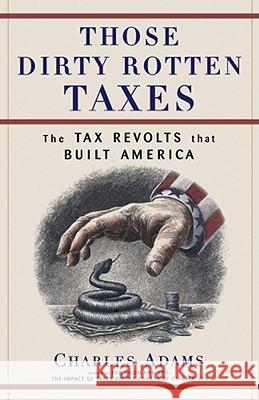Those Dirty Rotten Taxes: The Tax Revolts That Built America » książka
Those Dirty Rotten Taxes: The Tax Revolts That Built America
ISBN-13: 9780684871141 / Angielski / Miękka / 1999 / 256 str.
In 1798, after Congress had passed its first direct tax on houses, the government cooked up a scheme to count and measure the windows on every taxpayer's house, in order to calculate how much to charge. But German settlers in eastern Pennsylvania would have none of it. They organized into small bands, armed themselves, and scoured the countryside for assessors who were seized, assaulted, and driven across county lines. When some of the rebels were arrested, an auctioneer named John Fries marched on the courthouse and freed them. President John Adams called out the militia. Fries was arrested, tried for treason, and sentenced to be hanged.
It was hardly the first tax revolt in American history. From the Boston Tea Party to the Whiskey Rebellion to the Fries Rebellion, the late eighteenth century in America was full of armed violence in response to hated taxes. Yet, as Charles Adams recounts in this remarkable book, the Fries Rebellion was also far from the last of its kind.
Throughout its history America has been home to a series of little-known tax rebellions. These rebellions have played major roles in the presidencies of George Washington, John Adams, Thomas Jefferson, and many of their successors. They have helped bring about the Civil war, the birth of the Ku Klux Klan, and, ironically, the birth of the Internal Revenue Service. When the old Internal Revenue Bureau was strengthened to control moonshiner tax rebels in the Appalachias, it started a "Second Whiskey Rebellion" that continues even today. Country singer George Jones' popular ballad recalls:
G-Men, T-Men, Revenuers too, looking for the place where my pappy made his brew.
Today, as long-overdue calls for abolishing or overhauling the IRS are finally being heard in the halls of Congress, "Those Dirty Rotten Taxes" teaches us that we are continuing a long and vitally important American tradition. We have overthrown the tyranny of British taxes, Federalists' taxes, the Tariff, and the Revenuers' system. Has the tyranny of the Income Tax finally had its day?











